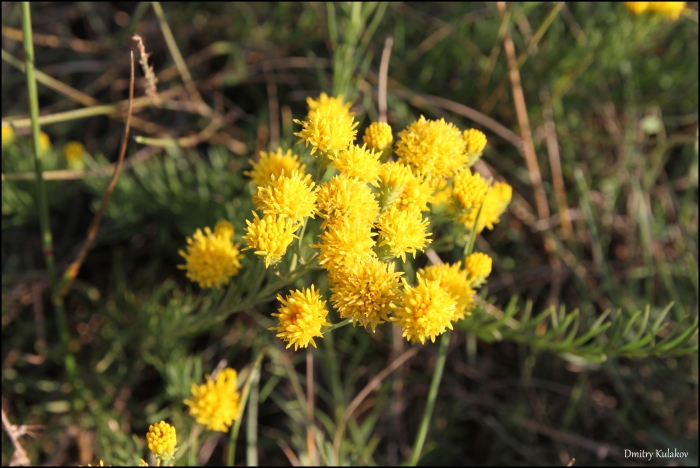Goldilocks Aster
(Galatella linosyris)
Goldilocks Aster (Galatella linosyris)
/
/

Dmitry Kulakov
CC BY 4.0
Image By:
Dmitry Kulakov
Recorded By:
Copyright:
CC BY 4.0
Copyright Notice:
Photo by: Dmitry Kulakov | License Type: CC BY 4.0 | License URL: http://creativecommons.org/licenses/by/4.0/ | Rights Holder: Dmitry Kulakov | Publisher: iNaturalist | Date Created: 2021-08-16T18:20:54-07:00 |

















Estimated Native Range
Summary
Galatella linosyris, commonly known as Goldilocks Aster or Goldilocks, is a perennial herb native to Europe and the Caucasus, specifically thriving in dry grasslands, scrublands, and open rocky areas, often on calcareous (limestone) soils. It typically grows to a height of 1.5-2 feet (0.46-0.6 meters) and a width of 1-1.5 feet (0.3-0.5 meters). This plant is characterized by its narrow, lance-shaped leaves and branching stems topped with clusters of bright yellow, daisy-like flowers that are quite showy and bloom profusely in the summer and fall, attracting pollinators.
Goldilocks Aster is valued for its vibrant yellow flowers and its ability to thrive in poor, dry soils, making it an excellent choice for rock gardens, xeriscaping, and borders in drought-prone areas. It is also used in wildflower meadows and naturalistic plantings. While it requires minimal maintenance, it is important to avoid overwatering and to provide well-draining soil to prevent root rot. It prefers full sun but can tolerate light shade. There are no major disease or pest issues, but it can be susceptible to powdery mildew in humid conditions. Goldilocks Aster is not known for aggressive roots or invasiveness, making it a well-behaved addition to the garden.CC BY-SA 4.0
Goldilocks Aster is valued for its vibrant yellow flowers and its ability to thrive in poor, dry soils, making it an excellent choice for rock gardens, xeriscaping, and borders in drought-prone areas. It is also used in wildflower meadows and naturalistic plantings. While it requires minimal maintenance, it is important to avoid overwatering and to provide well-draining soil to prevent root rot. It prefers full sun but can tolerate light shade. There are no major disease or pest issues, but it can be susceptible to powdery mildew in humid conditions. Goldilocks Aster is not known for aggressive roots or invasiveness, making it a well-behaved addition to the garden.CC BY-SA 4.0
Plant Description
- Plant Type:
- Height: 1.5-2 feet
- Width: 1-1.5 feet
- Growth Rate: Moderate
- Flower Color: Yellow
- Flowering Season: Summer, Fall
- Leaf Retention: Deciduous
Growth Requirements
- Sun: Full Sun
- Water: Low
- Drainage: Fast
Common Uses
Border Plant, Butterfly Garden, Low Maintenance, Rock Garden
Natural Habitat
Native to dry grasslands, scrublands, and open rocky areas on calcareous soils in the Mediterranean Basin
Other Names
Common Names: Goldilocks Starwort , Goldilocks
Scientific Names: Galatella linosyris , Aster linosyris subsp. linosyris , Aster savii , Aster vulgaris , Chrysocoma inaequata , Chrysocoma inaequata , Chrysocoma palustris , Crinitaria linosyris subsp. linosyris , Crinitina linosyris subsp. linosyris , Erigeron tenuifolius subsp. tenuifolius , Linosyris vulgaris var. vulgaris
GBIF Accepted Name: